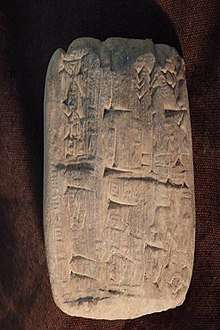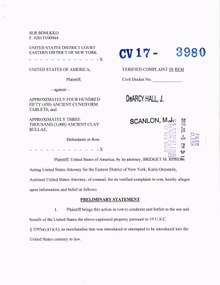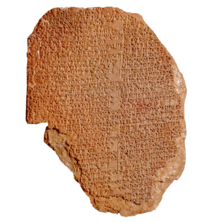Hobby Lobby smuggling scandal
The Hobby Lobby smuggling scandal is a series of events starting in 2009 when representatives of Hobby Lobby received a large number of clay bulla and tablets. The artifacts were intended for the Museum of the Bible, funded by the Evangelical Christian Green family, which owns the Oklahoma-based chain of craft stores.[1] Internal staff had warned superiors that the items had dubious provenance and were potentially stolen. In 2017 the United States District Court for the Eastern District of New York directed Hobby Lobby to return the artifacts and pay a fine of US$3,000,000. U.S. Immigration and Customs Enforcement returned 3,800 items seized from Hobby Lobby to Iraq in May 2018.[2]

Illegal importation of cultural property

In December 2010, Hobby Lobby purchased $1.6 million worth of Iraqi artifacts from dealers in the United Arab Emirates. The company went on with the purchase despite concerns from lawyers over the uncertain origin of the artifacts, and the possibility that they could have been looted. The shipments included tablets inscribed with cuneiform writing, which were misrepresented on declarations as being ceramic and clay tile samples, and contained false designations of origin stating that the objects were from Turkey and Israel. The company became subject to investigation by the U.S. government for these actions.[3][4][5][6][7]
Many of the artifacts collected by the Green family, the evangelical owners of the craft-supply chain Hobby Lobby, lacked any supporting evidence of their history or ownership. Thus raising the possibility that the artifacts were possibly looted or sold on the black market.[8] According to a Justice Department press release, "In October 2010, an expert on cultural property law retained by Hobby Lobby warned the company that the acquisition of cultural property likely from Iraq, including cuneiform tablets and cylinder seals, carries a risk that such objects may have been looted from archaeological sites in Iraq. The expert also advised Hobby Lobby to review its collection of antiquities for any objects of Iraqi origin and to verify that their country of origin was properly declared at the time of importation into the United States. The expert warned Hobby Lobby that an improper declaration of country of origin for cultural property could lead to seizure and forfeiture of the artifacts by CBP."[9]
In early July 2017, US federal prosecutors filed a civil complaint in the Eastern District of New York under the case name United States of America v. Approximately Four Hundred Fifty Ancient Cuneiform Tablets and Approximately Three Thousand Ancient Clay Bullae.[10] On July 5, 2017, Hobby Lobby consented to a settlement requiring forfeiture of the artifacts and payment of a fine of $3 million and the return of over 5500 artifacts.[11][6][12]
In the early hours of 30 July 2017, Israeli authorities raided several private residences and storefronts in Jerusalem belonging to five antiquities dealers of Palestinian origin and confiscated several historical artifacts, including a papyrus fragment from the Egyptian Book of the Dead and a Pompeiian fresco, and more than US$200,000 in cash.[13][6] They also found evidence of money laundering and tax evasion, as well as receipts bearing Christian Green's names. The Israeli Antiquities Authority had been contacted in 2016 by the United States Department of Homeland Security, and provided Israeli authorities with evidence of money transfers between Green and Israeli-licensed antiquities dealers. In all, five individuals were arrested for tax evasion.[14]
The 2019 book Tablets From the Irisaĝrig Archive mentions the scandal in its analysis of more than one thousand cuneiform tablets, possibly stolen from Irisaĝrig, a 4,000-year-old lost city in Iraq.[15] The tablets, purchased by Hobby Lobby, were studied over a four year period while in the company's Oklahoma storerooms. "The new find shows that the company Hobby Lobby — whose co-owner, Steve Green, helped found the Museum of the Bible in November 2017 in Washington, D.C. — had far more cuneiform tablets obtained (possibly illegally) from this city, and other sites in Iraq, than previously believed." As many as 1400 artifacts to be returned to Iraq appear to be missing from the Hobby Lobby collection.[16][17]
Collections management controversy
Counterfeit items
In October 2018, the Museum of the Bible revealed that five of its sixteen Dead Sea Scrolls fragments are counterfeit;[18] and in March 2020, independent art fraud investigators hired by the museum revealed that all sixteen fragments are counterfeit, made from ancient leather and modern inks.[19]
The museum removed the display of another disputed artifact, a miniature bible which a NASA astronaut had purportedly carried to the moon.[20]
Stolen items

In October 2019, officials from the British Egypt Exploration Society, a nonprofit organization that manages the Papyri Project, alleged that Oxford academic, Dirk Obbink, engaged in the theft and sale of "at least 11 ancient Bible fragments to the Green family, the Hobby Lobby owners who operate a Bible museum and charitable organization in Washington". The museum said it will return the fragments to the Egypt Exploration Society and Oxford University.[21]
In March 2020, National Geographic reported that the museum was "reevaluating the provenance of all the material in its collection" with the intent of returning stolen objects.[22] Steve Green, the museum's board chairman and the president of Hobby Lobby, announced the museum will be returning 11,500 artifacts to Egypt and Iraq, including thousands of papyrus scraps and ancient clay pieces. Green admitted, "I knew little about the world of collecting ... The criticism of the museum resulting from my mistakes was justified." Manchester University papyrologist Roberta Mazza stated that the Green family "poured millions on the legal and illegal antiquities market without having a clue about the history, the material features, cultural value, fragilities, and problems of the objects".[23]
This return includes the Gilgamesh Dream Tablet, containing part of the Epic of Gilgamesh, discovered in Iraq in 1853, sold by the Jordanian Antiquities Association to an antiquities dealer in 2003,[24] and sold again by Christie's auction house to Hobby Lobby in 2014 for $1.6 million. The auction house lied about how the artifact had entered the market, claiming it had been on the market in the United States for decades. In September 2019, federal authorities seized the tablet, and in May 2020, a civil complaint was filed to forfeit it.[25][26][27]
References
- Taylor, Kate (October 23, 2018). "The $500 million Museum of the Bible founded by Hobby Lobby's controversial president has admitted it displayed fake Dead Sea Scrolls". Business Insider. Retrieved January 7, 2019.
- "ICE returns thousands of ancient artifacts seized from Hobby Lobby to Iraq". www.ice.gov. Retrieved 2018-05-03.
- "United States Files Civil Action To Forfeit Thousands Of Ancient Iraqi Artifacts Imported By Hobby Lobby". Justice.gov. Retrieved 2017-07-06.
- Baden, Candida Moss|Joel (2017-01-30). "Exclusive: Feds Investigate Hobby Lobby Boss for Illicit Artifacts". The Daily Beast. Retrieved 2017-07-05.
- Pilkington, Ed (2015-10-28). "Hobby Lobby investigated for trying to import ancient artifacts from Iraq". The Guardian. ISSN 0261-3077. Retrieved 2017-07-05.
- Feuer, Alan (2017-07-05). "Hobby Lobby Agrees to Forfeit 5,500 Artifacts Smuggled Out of Iraq". The New York Times. ISSN 0362-4331. Retrieved 2017-07-06.
- "Hobby Lobby: Christian firm's artefact smuggling case settled". BBC News. July 6, 2017. Retrieved July 6, 2017.
- Henry, Andrew (24 October 2018). "A Dead Sea Scrolls Forgery Casts Doubt on the Museum of the Bible". The Atlantic. Retrieved 14 March 2020.
- "United States Files Civil Action To Forfeit Thousands Of Ancient Iraqi Artifacts Imported By Hobby Lobby". U.S. DEPARTMENT OF JUSTICE. 2017-07-05. Retrieved 2017-08-02.
- Green, Emma (2017-07-05). "Hobby Lobby Purchased Thousands of Ancient Artifacts Smuggled Out of Iraq".
- James, Mike (July 6, 2017). "Hobby Lobby fined $3M over 5,500 smuggled Iraqi artifacts". USA Today. Retrieved November 18, 2019.
- Siu, Diamond Naga. "Hobby Lobby agrees to $3 million fine, forfeiture of thousands of Iraqi relics". POLITICO.
- "NPR: Israeli authorities arrest antiquities dealers in connection with Hobby Lobby scandal". NPR. August 1, 2017. Retrieved August 2, 2017.
- "5 Palestinians arrested in Hobby Lobby smuggling ring". The Jerusalem Post | JPost.com. Retrieved 2020-05-20.
- Sigrist, Marcel; Ozaki, Tohru (2019). Tablets From the Irisaĝrig Archive Part One. Cornell University studies in Assyriology and Sumerology. 40. University Park, Pennsylvania Eisenbrauns. ISBN 9781575067285. OCLC 1137101426.
- Jarus, Owen (January 7, 2020). "1,400 Ancient Cuneiform Tablets Identified from Lost City of Irisagrig in Iraq. Were They Stolen?". Live Science. Retrieved January 12, 2020.
- Cowie, Ashley (January 8, 2020). "Controversial Cuneiform Tablets Tell Tales of Security Dogs and a Lost City". Ancient Origins. Retrieved January 12, 2020.
- Sullivan, Emily (October 23, 2018). "Museum Of The Bible Says 5 Of Its Most Famed Artifacts Are Fake". NPR. Retrieved January 7, 2019.
- Luscombe, Richard (16 March 2020). "'Dead Sea Scrolls fragments' at Museum of the Bible are all fakes, study says". The Guardian. Retrieved 16 March 2020.
- Miller, Ken (October 5, 2019). "Museum of the Bible quietly replaces questioned artifact". Associated Press. Retrieved November 18, 2019.
- Gleiter, Dan (October 15, 2019). "Oxford professor allegedly sold ancient, stolen Bible artifacts to Hobby Lobby". Washington Post. Retrieved November 18, 2019.
- Greshko, Michael (March 13, 2020). "Exclusive: 'Dead Sea Scrolls' at the Museum of the Bible are all forgeries". National Geographic. Retrieved March 13, 2020.
- Cascone, Sarah (30 March 2020). "Amid Scrutiny, the Museum of the Bible's Founder Will Return a Staggering 11,500 Artifacts of Dubious Origin to the Middle East". ArtNet News. Retrieved 18 April 2020.
- Meier, Martin Gottlieb With Barry (2003-05-01). "AFTEREFFECTS: THE PLUNDER; Of 2,000 Treasures Stolen in Gulf War of 1991, Only 12 Have Been Recovered". The New York Times. ISSN 0362-4331. Retrieved 2020-05-19.
- Stelloh, Tim (18 May 2020). "Authorities announce forfeiture of ancient Gilgamesh tablet from Hobby Lobby's Museum of the Bible". NBC News. Retrieved 19 May 2020.
- "Civil action filed to forfeit rare cuneiform tablet from Hobby Lobby". www.ice.gov. Retrieved 2020-05-19.
- Justice.gov https://www.justice.gov/usao-edny/press-release/file/1277316/download. Retrieved 21 May 2020. Missing or empty
|title=(help)
External links
| Wikimedia Commons has media related to Hobby Lobby smuggling scandal. |
- Bible museum replaces chief executive after one year, Washington Post
- United States Files Civil Action To Forfeit Thousands Of Ancient Iraqi Artifacts Imported By Hobby Lobby, the July 2017 United States government complaint
- Hobby Lobby to pay $3 million fine, forfeit ancient artifacts, CNN
- Iraqi Artifacts Once Bought by Hobby Lobby Will Return Home, The New York Times
- Hobby Lobby's Smuggled Artifacts Will Be Returned To Iraq, NPR
- Some of Hobby Lobby’s Smuggled Artifacts May Come From Lost Sumerian City, Smithsonian
- ‘It’s the First Domino’: After the Museum of the Bible Discovered Its Dead Sea Scrolls Are Fake, the Field Braces for More Revelations, ArtNet News